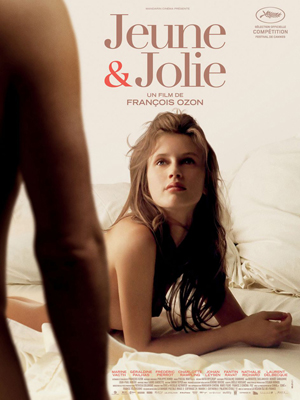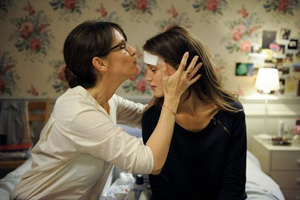Jeune et Jolie (Young and Beautiful): Not So Pretty Baby
- SUBSCRIBE
- ALREADY SUBSCRIBED?
BECOME A BONJOUR PARIS MEMBER
Gain full access to our collection of over 5,000 articles and bring the City of Light into your life. Just 60 USD per year.
Find out why you should become a member here.
Sign in
Fill in your credentials below.
 There is a real story lurkng in François Ozon’s new film, Jeune et Jolie (Young and Beautiful), but it’s never fully developed. The movie is about a teenaged, middle-class Parisian girl who prostitutes herself. Her most regular customer, Georges (Johan Leysen), is an older man with a craggy face and melancholy look out of a Rembrandt portrait—his deep lines are all the shadow needed to express his existential anguish. There seems to be some real contact between him and the jaded young girl. Supposedly they become friends, but this is never detailed. We never get their talk or their tenderness.
There is a real story lurkng in François Ozon’s new film, Jeune et Jolie (Young and Beautiful), but it’s never fully developed. The movie is about a teenaged, middle-class Parisian girl who prostitutes herself. Her most regular customer, Georges (Johan Leysen), is an older man with a craggy face and melancholy look out of a Rembrandt portrait—his deep lines are all the shadow needed to express his existential anguish. There seems to be some real contact between him and the jaded young girl. Supposedly they become friends, but this is never detailed. We never get their talk or their tenderness.
At the beginning of the film we follow Isabelle and her family on holiday at a beach resort. She befriends a handsome German teenager and loses her virginity to him. It’s not an ideal moment, but losing one’s virginity often isn’t. The German leaves the picture, the family leaves the resort. But something has changed in Isabelle, and not for the better. Since Ozon doesn’t give much insight into her character, we can only deduce some neo-Victorian, and not very French, idea that sex is bad for young girls.
Ozon also takes a conservative view of a certain type of contemporary French family. Isabelle’s parents are divorced, and she and her brother rarely see their father. The mother lives with someone who seems to be a decent man, but also rather insipid, a nebbish. The mother herself is complacent and clueless. The director’s caricature gets a few unearned laughs, but isn’t persuasive, even if Géraldine Pailhas as the mother and Frédéric Pierrot as her partner are quite convincing.
 Marine Vacth gives an affecting, sympathetic performance as Isabelle, and her impassive expression, which sometimes becomes nervous or sullen, is always natural. We watch with trepidation as she loses her innocence and becomes more “adult.” But she doesn’t have much range (maybe she isn’t supposed to) or depth (ditto). We never learn why she does what she does, and what effect it has on her (other than the loss of innocence).
Marine Vacth gives an affecting, sympathetic performance as Isabelle, and her impassive expression, which sometimes becomes nervous or sullen, is always natural. We watch with trepidation as she loses her innocence and becomes more “adult.” But she doesn’t have much range (maybe she isn’t supposed to) or depth (ditto). We never learn why she does what she does, and what effect it has on her (other than the loss of innocence).
Jeune et Jolie is obviously inspired by true stories of young girls selling their bodies. There have been journalistic accounts of the phenomenon in France, Japan and elsewhere. The girls in question seem caught up in consumer culture, wanting to make money to spend money on expensive goods—fashion slavery leading to sex slavery. Isabelle charges hundreds of Euros for her services, and we see her accumulating a hefty kitty. But she doesn’t seem to be a fashion victim or big spender. We never find out why she’s saving up. Maybe the idea is to give her a sense of mystery? It works in a way, but isn’t really genuine—it’s the cinematic equivalent of a hooker’s come-on.
 In addition to bringing out good performances, Ozon, one of France’s most well-known directors, obviously knows how to shoot a film. Visually there are never any false notes. But the script is pedestrian and the dialogue leaden, with one sordid thing after another dumped on the audience. Ozon serves up plenty of montages of Isabelle having sex in diverse ways, but the effect is, as Judge Woolsey said about the sex in Ulysses, emetic rather than aphrodisiac.
In addition to bringing out good performances, Ozon, one of France’s most well-known directors, obviously knows how to shoot a film. Visually there are never any false notes. But the script is pedestrian and the dialogue leaden, with one sordid thing after another dumped on the audience. Ozon serves up plenty of montages of Isabelle having sex in diverse ways, but the effect is, as Judge Woolsey said about the sex in Ulysses, emetic rather than aphrodisiac.
The film gets interesting towards the end, after Isabelle’s activities are uncovered. Her mother unsurprisingly delegates dealing with her daughter’s problem to a psychiatrist, who is snarkily portrayed as a bit of a whore himself. Family and friends try to be understanding in comically ineffectual ways. Isabelle’s new relationship with a boy her age seems vapid compared with her past. Here satire is effective, and even incisive. But then Ozon winds up showing the sentimental underside of every scourge: a well-done piece of fakery featuring Charlotte Rampling.
 Before that there is an earnest sequence in which a policewoman speaks to Isabelle’s mother about her daughter’s meetings with Georges. She says that since Isabelle was 17 years old at the time of the facts, she was Georges’ victim. Presumably this is because Georges was a more experienced, knowledgeable person, with the power of money over an innocent girl. But what do you call it when a famous director prevails on a 22-year-old actress to explicitly display her body and simulate sex for the privilege of starring in a meretricious and morally obtuse movie?
Before that there is an earnest sequence in which a policewoman speaks to Isabelle’s mother about her daughter’s meetings with Georges. She says that since Isabelle was 17 years old at the time of the facts, she was Georges’ victim. Presumably this is because Georges was a more experienced, knowledgeable person, with the power of money over an innocent girl. But what do you call it when a famous director prevails on a 22-year-old actress to explicitly display her body and simulate sex for the privilege of starring in a meretricious and morally obtuse movie?
Production: Mandarin Cinéma
Distribution: Mars Distribution
More in film review, French film, Jeune et Jolie, Paris film




